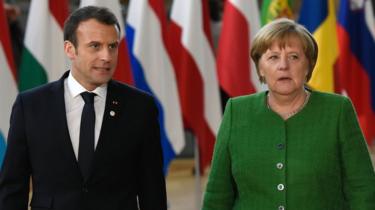 GETTY IMAGES
GETTY IMAGES
Germany and France have warned that funding cuts to EU programmes after Brexit could damage efforts to tackle illegal immigration and terrorism.
The leaders of both nations said on Friday that spending on these areas should not be compromised.
But other wealthy member states have argued that a smaller EU - without the UK - should mean a smaller budget.
It comes as leaders meet in Brussels to decide whether to raise contributions or reduce funding to EU programmes.
Arriving for the informal discussions on Friday, German Chancellor Angel Merkel said it was important not to reduce financial support to operations that had proved effective in tackling issues such as terrorism in the Sahel region of north and west Africa.
"We are all contributing financially to the anti-radicalisation military operations in this region and that is starting to pay dividends," she said. "We also need to work together... with Libya to combat illegal migration."
French President Emmanuel Macron, who arrived alongside Mrs Merkel, said that France was also "committed" in the fight to "eradicate terrorism" and the "trafficking of humans" through Africa.
Separately, it has been announced that the UK Prime Minister Theresa May is to deliver a speech setting out her vision for the UK's future relationship with the EU on 2 March 2018.
Ahead of Friday's talks, European Commission President Jean-Claude Juncker said the EU needed to have "new priorities and policies". He added that if an agreement could not be reached to reduce funding for certain programmes, "we will have to pay more".
Mr Juncker also said he was concerned about a "rift between east and west". "Sometimes it gets wider and sometimes differences are bridged. I don't want any new divisions in Europe. We've had enough of those."
Lithuania's President Dalia Grybauskaitė said leaders had "a lot of new challenges" to address, but said the financial impact of Brexit was high on the agenda.
"Between the payments after Brexit and the promises of new policies, there is a lack of financial resources of about 20%," she said.
Estonia's Prime Minister Juri Ratas said it was "not an option" for the EU's future ambitions to be compromised. "We would like to see a stronger, safer and more united European Union," he said.
Luxembourg's Prime Minister Xavier Bettel said his country was not willing "just to pay more", adding that Europe needed to be "more efficient". "It's possible to change some expenses" he said.
Deciding how to fill the budgetary hole that Brexit will leave is problematic, says the BBC's Kevin Connolly, as net contributors such as Austria and the Netherlands take a sharply different view from net beneficiaries such as Poland and Greece.
While wealthier Northern countries make the case for a reduced budget, poorer member states in eastern and southern Europe are unhappy about the possibility of cuts to programme funding.
At Friday's talks, leaders will also debate structural issues within the bloc, such as appointing the successor to the EU Commission president and looking at whether future elections to the European parliament should include transnational lists of candidates.
Meanwhile on Twitter, the Vice-President of the European Commission, Frans Timmermans, hit back at UK Environment Secretary Michael Gove for suggesting that EU laws were hampering UK efforts to ban plastic drinking straws.
Mr Timmermans, using the hashtag #EUDoesntSuck, tweeted that new legislation was coming shortly.
No comments:
Post a Comment